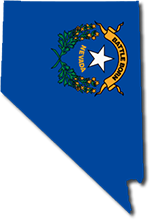Gambling Revenues: Nevada vs New Jersey

When comparing New Jersey vs Nevada gambling revenues, the latter has historically been the undisputed champion. Nevada has been the flagship of gambling in the United States since the 1950s. After New Jersey legalized casinos in the mid-seventies, its leaders thought they would build an east coast Las Vegas. As the only gambling destination east of the Mississippi River, the Jersey Shore attracted gamblers from America’s richest region. By the mid-eighties, Atlantic City was a serious competitor to Las Vegas, attracting resort moguls like Donald Trump, Barron Hilton, and Steve Wynn.
Nevada vs New Jersey Gambling Revenues
The Breakdown
The Background For Nevada and New Jersey Gambling
In the decades since, however, Atlantic City fell to a distant second among US gaming destinations. A 1988 law allowed tribal gaming to end Atlantic City’s east coast casino monopoly, which in turn led to a vast expansion of commercial casinos and racinos on the eastern seaboard. A fragmented market hurt Atlantic City. The AC casino sector fell from $5.4 billion in revenues in 2006 to $2.1 billion in revenues by 2015. Las Vegas has 104 vibrant and lucrative casinos, while financial analysts speculated that Atlantic City’s 9 casinos might be too many.
A new picture is emerging in the three years since. New Jersey’s Atlantic City has rebounded from its low point, while the Las Vegas Strip has seen a decline in revenues since June 2018. That same month, two resorts opened on the Boardwalk. And over the past two years, New Jersey gaming revenues continue to increase year-to-year, while Nevada’s revenues are down over the past year. Faced with a 60% decline, Atlantic City operators have had to become inventive to stay afloat.
Nevada Online Gambling
 While NJ was busy, Nevada missed the boat when it came to online gambling. The first online site to open, Station Casinos’ Ultimate Poker, closed two years after launching. The only two Nevada sites active today are Caesars Entertainment‘s WSOP Nevada Card Site and Real Gaming Online Poker, which is owned by the South Point Hotel and Casino.
While NJ was busy, Nevada missed the boat when it came to online gambling. The first online site to open, Station Casinos’ Ultimate Poker, closed two years after launching. The only two Nevada sites active today are Caesars Entertainment‘s WSOP Nevada Card Site and Real Gaming Online Poker, which is owned by the South Point Hotel and Casino.
Part of the problem is structural. Nevada is the 33rd most populous US states, while New Jersey is 11th in population. Even when Nevada signed an interstate poker compact with Delaware (45th in population), it hardly made a difference.
Nevada Casino Revenues: A Five-Year Trend
Nevada’s overall revenues were up 2% in 2018, but the Las Vegas Strip continues to see a decline. The Nevada Gaming Commission reports the Vegas Strip’s August 2018 numbers were down 6% year-to-year. September 2018 was even worse with a 7% decline. Las Vegas executives say a 30% drop in baccarat revenues the past 5 years is the main reason their numbers are down.
They were pointing to 2% in slots revenues in 2018 – as a good sign. Yet, slots row can’t save the Strip casinos forever. Millennials dislike slots and prefer skill-based games, or at least games with a social aspect. Ironically, faced with an uncertain future, Las Vegas Strip casinos are embracing innovative new forms of gambling.
Las Vegas Strip casinos have introduced skill-based gambling and slot machines, eSports studios, virtual sports betting, VR tech gaming, and electronic table games studios over the past two years. Now that the 95 million American millennials replaced the 75 million (and shrinking) Baby Boomer generation as the most lucrative demographic, Vegas executives are aware they have to find ways to attract a new generation of customers.
New Jersey Online Gambling
 A little over five years since New Jersey took a chance on online casinos and poker sites, the investment is paying off. New Jersey gaming revenue has increased year-to-year from its launch in November 2013. In its first calendar year of operations, New Jersey online gambling generated roughly $120 million. In 2018, those numbers were just under $300 million.
A little over five years since New Jersey took a chance on online casinos and poker sites, the investment is paying off. New Jersey gaming revenue has increased year-to-year from its launch in November 2013. In its first calendar year of operations, New Jersey online gambling generated roughly $120 million. In 2018, those numbers were just under $300 million.
October 2018 set a new record with $26.75 million, which beat the previous record of $25.9 million in July 2018. Those numbers were eclipsed again in December 2018 when the total gaming win from online gambling was $29.08 million. The total NJ gaming win for all of 2018 was $298.696 million.
New Jersey Revenues
- Online Poker: PokerStars is the clear leader with Borgata a distant second place.
- Online Casinos: SugarHouse and Golden Nugget win the niche with Borgata a strong rival.
- Land-Based Sportsbooks: Meadowlands and Paddy Power-Betfair should dominate. Atlantic City casinos partnered with William Hill and DraftKings.
- Live Sports Betting Apps: FanDuel’s live in-play betting app is first of its kind in Jersey.
- Non-Gaming Revenues: Hard Rock AC’s concert schedule drives visitors to the city.
New Jersey Embraces Innovation
Atlantic City casinos were among the earliest to embrace online gambling. When the US Department of Justice changed its stance on online casinos and poker sites in late 2011, New Jersey Governor, Chris Christie (R) and State Senate President Stephen Sweeney (D), championed a bipartisan referendum to legalize interactive gambling in the state. That led to a rollout in November 2013 with most of the Atlantic City companies participating.
It was rough going at first. Geo-location technology didn’t work the way it was supposed to. Jersey players across the rivers from New York City and Philadelphia showed to be out of state and were banned from playing in the first months. 45% of MasterCard deposits and a whopping 70% of Visa deposits declined because the financial institutions issuing the credit cards flagged the payments as illegal. It was considered a fiasco.
Despite appearances, online gambling became a boon to the Atlantic City casinos. In its first year, New Jersey’s iGaming industry generated $120 million. Four years into the experiment, the number has grown to $250 million. The glitches are fixed. Original brands like Borgata, Caesars, 888, and WSOP.com continue to churn out cash, while later additions like PokerStars and SugarHouse Casino have boosted the sector’s visibility and prestige.
Atlantic City Casino Expansion
At the same time, Atlantic City’s casino industry is regenerating. When four casinos closed in 2014, it seemed the death knell for Boardwalk casinos. The closure of Trump Taj Mahal in October 2016 left the city with only seven operating casinos, while the city government was bankrupt.
With less competition, those seven casinos were profitable, though. That’s why financial experts grew concerned when Hard Rock Atlantic City and Ocean Resort Casino opened on June 28 of 2018. Would two more casinos hurt all the operations? So far, that hasn’t been the case. With a stronger US economy and two solid ownership companies behind the new venues, Atlantic City appears to have integrated the new businesses.
According to the NJ Division of Gaming Enforcement, Atlantic City’s land-based gaming revenues are down from 2017 to 2018. When you add in online poker, online casinos, and overall sports betting, the numbers for the year are up. By embracing innovation and pushing for new forms of gambling, New Jersey has grown its gaming sector.
PlaySugarHouse: New Jersey’s Top Online Casino
Golden Nugget Casino, which holds the sub-license for the popular PlaySugarHouse website, led the market with $9.7 million for a 58% growth year-to-year. PlaySugarHouse was a late addition to New Jersey’s gaming market (September 2016), but it ascended to the top of the online casino niche within three months of launch. Associated with the SugarHouse Casino in Philadelphia, the site gained popularity because it licensed video slots from some of the top names in land-based slot machine manufacturing: International Game Technology (IGT), Bally Technologies, WMS Gaming, and Konami.
Nevada and New Jersey Non-Gaming Revenues
 People should remember that the Las Vegas Strip is more than just its gaming space anymore. In the era of the integrated resort, non-gaming revenues represent 60% or more of the Vegas Strip’s revenues. Posh restaurants, swanky nightclubs, high-end retail outlets, and famous Vegas shows are a big part of the financial picture.
People should remember that the Las Vegas Strip is more than just its gaming space anymore. In the era of the integrated resort, non-gaming revenues represent 60% or more of the Vegas Strip’s revenues. Posh restaurants, swanky nightclubs, high-end retail outlets, and famous Vegas shows are a big part of the financial picture.
Atlantic City is taking a cue from Vegas in that way. In the dark days of 2014, former Atlantic City Mayor, Don Guardian, talked about a transition to non-gaming revenues as a way to diversify the local economy. Hard Rock Atlantic City has scheduled 200 concerts and live shows over its first year of operation. Atlantic City executives are planning more e-sports events.
Las Vegas Sportsbooks Face Competition
New Jersey was the champion of legal sports betting, too. Over the last 25 years, Nevada has had a monopoly over single-game sports bets. The Professional and Amateur Sports Protection Act (PASPA) which went into effect banned sports betting in 46 states and restricted bookmaker bets to “sports lotteries” – a form of parlay bet – in three others. Because it was the only legal way to bet on the NFL, NBA, and Major League Baseball, Las Vegas sportsbooks became some of the largest in the world.
In 2018, Nevada has a combined 128 sportsbooks and betting shops. Nevada’s sports betting market is saturated and it’s about to have a lot more competition. Las Vegas sportsbooks can expand to other states behind their famous brand names: MGM Resorts, William Hill US, and Caesars Entertainment already are trying to do so. In Nevada, though, sports betting revenues very well could decline in this new era.
New Jersey Sports Betting
The same can’t be said about New Jersey. Since the US Supreme Court struck down PASPA in May 2018, events moved quickly in the Garden State. The legislature approved single-game sports betting in June. Longtime US sports gaming operators like William Hill, FanDuel, and DraftKings entered the New Jersey market. UK operators like Paddy-Power Betfair and GVC Holdings signed strategic partnerships.
Land-based sportsbooks opened in Atlantic City, as well as Monmouth Park Racetrack in Oceanport and Meadowlands Racetrack in East Rutherford. The Meadowlands sportsbook, operated by Paddy-Power Betfair and FanDuel, is pivotal. With a short trip over the Hudson River, twenty million residents of New York City can place a sports bet at Meadowlands.
Interstate Online Poker Compact
 By comparison, Nevada online poker gambling revenues have been stagnant. Starting in 2014, Nevada Gov. Brian Sandoval and Caesars Entertainment’s WSOP.com led to the creation of the Multi-State Internet Gaming Association (MSIGA), usually called the interstate poker compact. Nevada and Delaware signed the MSIGA in 2014 and launched shared player liquidity in 2015. New Jersey signed the poker compact in 2017, which led to speculation Pennsylvania would join MSIGA once it launched online poker sites 2019. It was not to be.
By comparison, Nevada online poker gambling revenues have been stagnant. Starting in 2014, Nevada Gov. Brian Sandoval and Caesars Entertainment’s WSOP.com led to the creation of the Multi-State Internet Gaming Association (MSIGA), usually called the interstate poker compact. Nevada and Delaware signed the MSIGA in 2014 and launched shared player liquidity in 2015. New Jersey signed the poker compact in 2017, which led to speculation Pennsylvania would join MSIGA once it launched online poker sites 2019. It was not to be.
The U.S. Department of Justice’s Office of Legal Counsel (OLC) announced in January 2019 a change in its opinion on the 1961 Federal Wire Act. Where previously the OLC had held that online sports betting was banned under the Wire Act, the federal prosecutor now holds that interstate online poker and online casinos are banned. While most online gambling in New Jersey and Nevada are handled inside a state’s boundaries with an electronic geo-fence, the MSIGA is by necessity an interstate gaming network. The 2019 DOJ opinion asserts the interstate poker compact is banned under federal law.
New Jersey vs US Department of Justice
 Pennsylvania Attorney General Josh Shapiro and New Jersey Attorney General Gurbir Singh Grewal sent a letter to the US Department of Justice disputing the 2019 opinion. Shapiro and Singh Grewal’s letter signals that Pennsylvania and New Jersey will sue the federal government to challenge the online poker ban. New Jersey has won big in the federal courts before. The 2018 U.S. Supreme Court repeal of a federal sports betting ban changed the face of the US gambling industry.
Pennsylvania Attorney General Josh Shapiro and New Jersey Attorney General Gurbir Singh Grewal sent a letter to the US Department of Justice disputing the 2019 opinion. Shapiro and Singh Grewal’s letter signals that Pennsylvania and New Jersey will sue the federal government to challenge the online poker ban. New Jersey has won big in the federal courts before. The 2018 U.S. Supreme Court repeal of a federal sports betting ban changed the face of the US gambling industry.
It could happen again, but while a challenge to the DOJ’s opinion on the 1961 Wire Act might strike down the ban, it could take years to settle in federal court — much like Murphy v. NCAA required 6 years to settle the sports betting issue. Nevada backed interstate online poker and will be mired in lawsuits for years, while New Jersey focused on single-state online casinos and its growth has been extraordinary.
What is notable is the fact New Jersey and Pennsylvania are taking the lead on online poker – not Nevada itself. New Jersey has more to gain from Internet poker, while Nevada clings to the land-based gaming model. A full 5 years after the interstate poker compact was signed, only 2 of Nevada’s 334 gaming venues have online poker rooms. Nevada casino operators focus on the old gaming economy.
Will Online Gambling Replace Land-Based Casinos?
Many have asked whether online gambling will replace land-based casinos. It’s a question that everyone from Sheldon Adelson to JPMorgan Chase has explored. The answer is “No”, but online casinos and poker sites are going to enhance revenues for land-based operations. Struggling casinos will have the money to continue. Strong casinos will have more cash to invest in innovation types of gaming.
Perhaps in some distant future, everyone will stay home and gamble online. As long as human beings want to go out with friends and loved ones, and see new things, land-based casinos are going to be a part of the American betting experience. Online and mobile gambling will become a bigger percentage of the US gambling economy, but restaurants, bars, clubs, concerts, and attractions will continue to lure people to the Las Vegas Strip and the Atlantic City Boardwalk.



